In this project, we set out to explore which experiences would cause most individuals to take legal action and how much they’d expect in compensation once they did. To do so, we surveyed over 1,000 individuals about theoretical instances of injury, as well as their real lawsuit outcomes. Going further, we explored how attitudes differ by gender and generation, and why many decide against filing a lawsuit despite having good reason to do so. Which wrongdoings warrant legal action in the minds of the general public? Keep reading to find out.
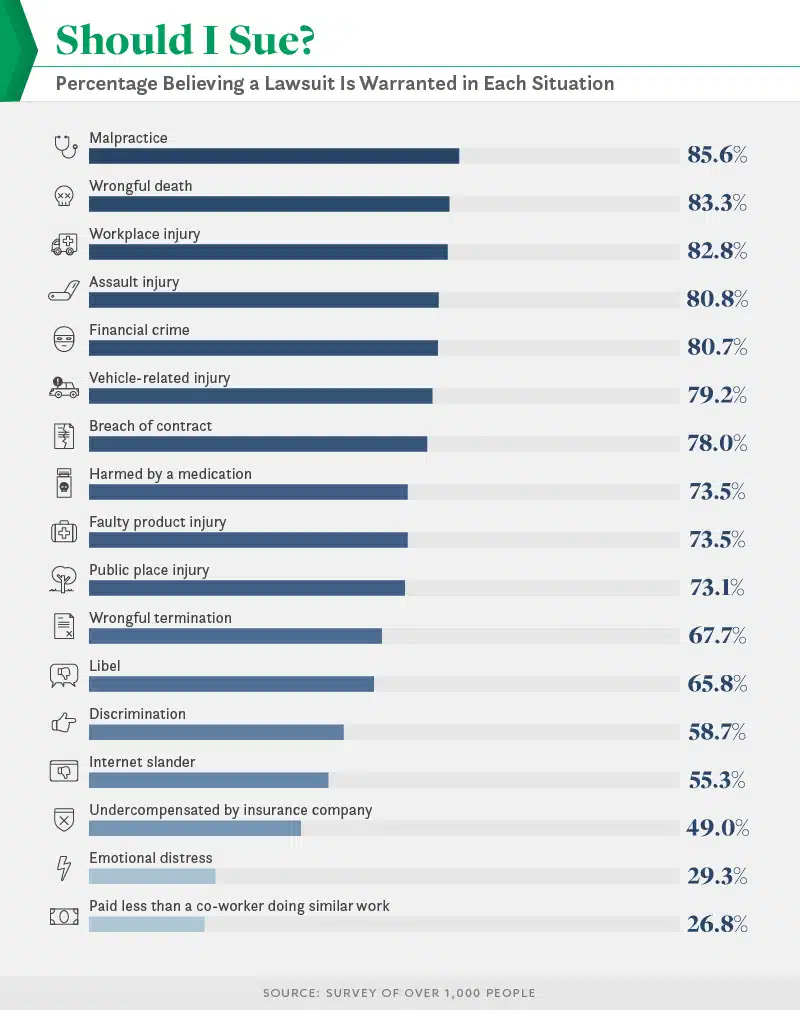
The Likelihood of Legal Action
Among possible offenses, medical wrongdoing was most likely to provoke a desire to sue among respondents. Nearly 86 percent felt medical malpractice would warrant legal action, and 83 percent felt an instance of wrongful death should result in a lawsuit. These feelings may account for the prevalence of suits against medical practitioners. According to the American Medical Association, more than a third of doctors have had a malpractice claim filed against them. Beyond the medical field, respondents felt comfortable holding businesses accountable for injuries suffered on their premises: Nearly 83 percent said it was appropriate to sue an establishment in such circumstances.
Indeed, most respondents felt incidents of physical harm in other contexts would justify a lawsuit: Roughly 4 in 5 respondents said an assault or vehicular injury would be worth suing over, and 74 percent said the same regarding harm resulting from a dangerous drug or flawed product. At the other end of the spectrum, however, most respondents felt skeptical about emotional distress as a basis for seeking to file a lawsuit. Additionally, just 27 percent felt being paid less than a similarly qualified peer was an appropriate reason to file a lawsuit. Interestingly, this opinion seems disjointed from existing laws on such matters. Allegations of unfair pay are the only instance in which an individual can bring a federal discrimination lawsuit against an employer without first receiving approval from the Equal Employment Opportunity Commission.
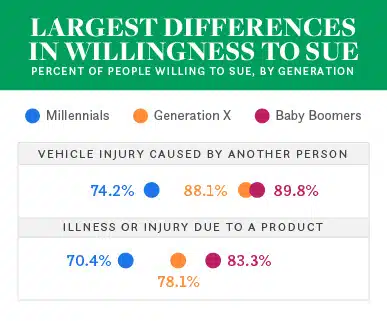
Stances on Suing, by Age and Gender
Our data suggest that views on how appropriate a lawsuit might be in different situations vary substantially by demographic in some cases. Relative to older generations, for example, millennials were far less likely to believe being injured by someone else in a vehicle was an appropriate basis for a lawsuit. A similar correlation between age and willingness to sue emerged around illness or injury resulting from a faulty product. This pattern could simply reflect the reality of aging: As we grow older, the risks associated with these forms of injury increase, creating greater incentive to sue. Older adults are more likely to die or suffer serious injury when involved in car crashes, for example, or as a result of food poisoning.
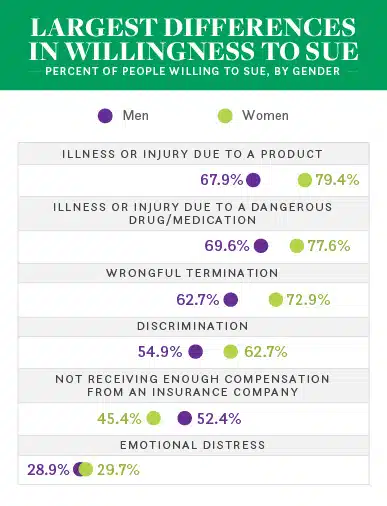
Gender differences emerged as well: More than 79 percent of women said injuries stemming from flawed goods were worth suing over, whereas just 68 percent of men said the same. Similarly, women were far more likely to approve of suing over faulty medications. These findings could relate to recent class-action lawsuits regarding products specifically marketed for women, such as pelvic mesh implants said to cause excruciating pain or a hair care product reported to cause hair loss. Additionally, female respondents were much more likely to support suing in circumstances of wrongful termination or discrimination. Given that over 40 percent of women report experiencing gender discrimination in the workplace, it’s no surprise they find more merit in pursuing a lawsuit when warranted.
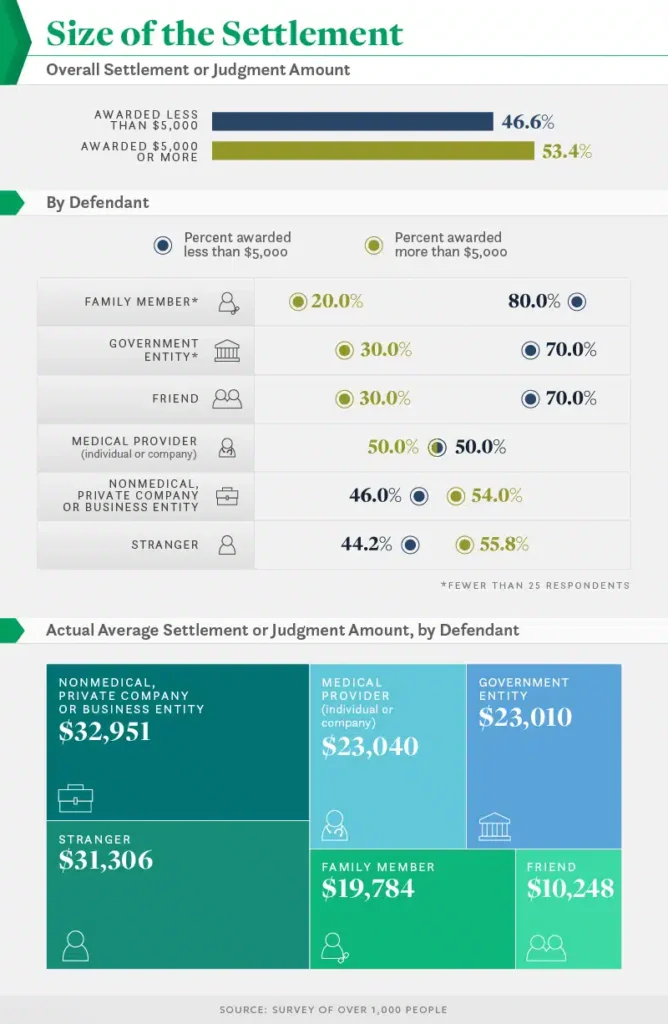
Sizing Up Settlements
Moving beyond theoretical circumstances in which respondents might sue, we asked individuals who had previously filed a lawsuit about their actual outcomes. In only a slim majority of cases, respondents’ settlements or judgments exceeded $5,000. In reviewing these findings, it’s important to note that many states (such as Florida and Virginia) limit potential small claims court judgments to $5,000 or less. This dynamic could explain the prevalence of small awards for certain interpersonal disputes. In cases against family members, for example, 80 percent of plaintiffs who received an award or settlement got less than $5,000.
Those who successfully sued businesses typically received more money: Half of winning plaintiffs who filed lawsuits against medical providers received $5,000 or more – and some analyses suggest the average medical malpractice settlement has increased substantially in recent years. People who sued private companies outside of the medical field were even more successful in this regard. People who received payouts larger than $5,000 most often sued individuals with whom they had no prior relationship. Among this cohort, nearly 56 percent claimed a settlement or judgment of $5,000 or more.
Despite the exclusion of outlying figures below $500, actual settlement and judgment totals often lagged well-behind what respondents deemed fair regardless of the offense or defendant in question. On average, people who sued medical providers received $23,040 – a sizable amount, but less than the hypothetical six-figure total our respondents suggested for malpractice suits. Suits against friends or family members had the lowest average payout in our study ($10,248 and $19,784, respectively), while cased against strangers resulted in an average compensation of over $31,000. This figure was relatively close to what our respondents deemed appropriate for certain kinds of wrongdoing that might cause one to sue a stranger. With regard to assault injuries, for instance, the average suggested settlement was $30,000.
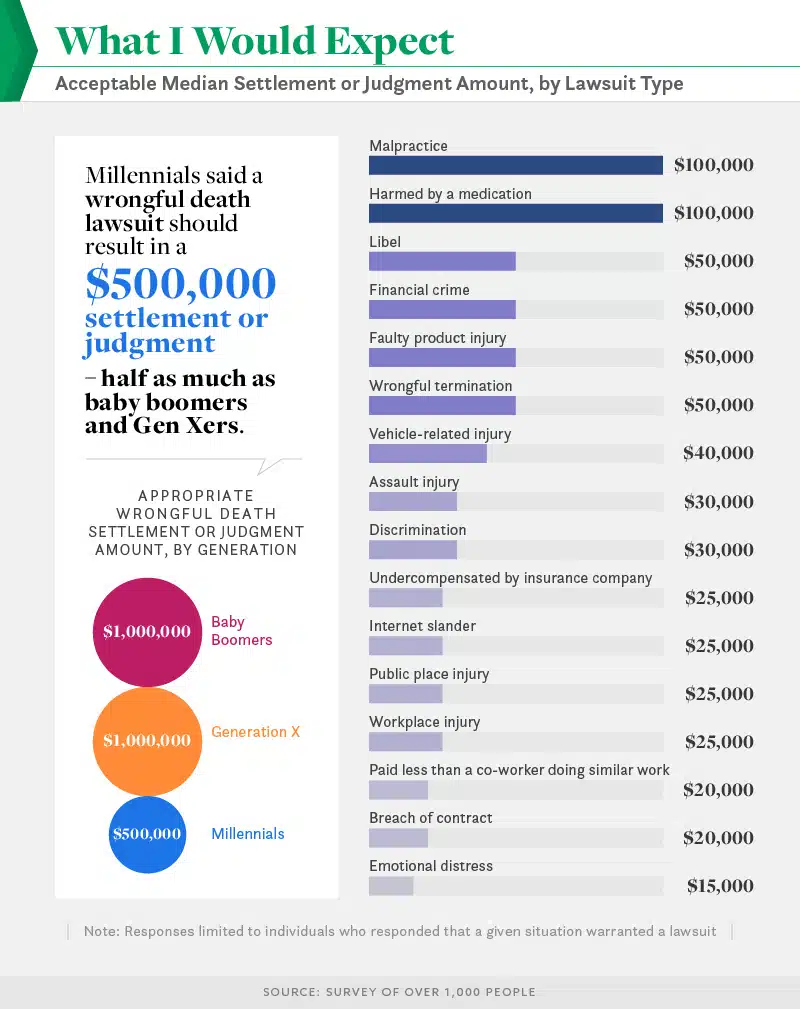
Appropriate Awards
When sizing up which harm warranted the most compensation, respondents seemed particularly critical of medical-related injuries. On average, people believed malpractice or harm by a medication should result in a settlement of $100,000. Respondents believed appropriate compensation for wrongful death cases should be even greater, although generational differences on this subject were clear. Whereas baby boomers and Gen Xers judged $1 million to be an appropriate settlement in a wrongful death lawsuit, millennials felt the right value was just $500,000. Perhaps this dynamic relates to the consideration of one’s offspring: Older people are more likely to have children or grandchildren who might benefit from such a settlement if they were killed.
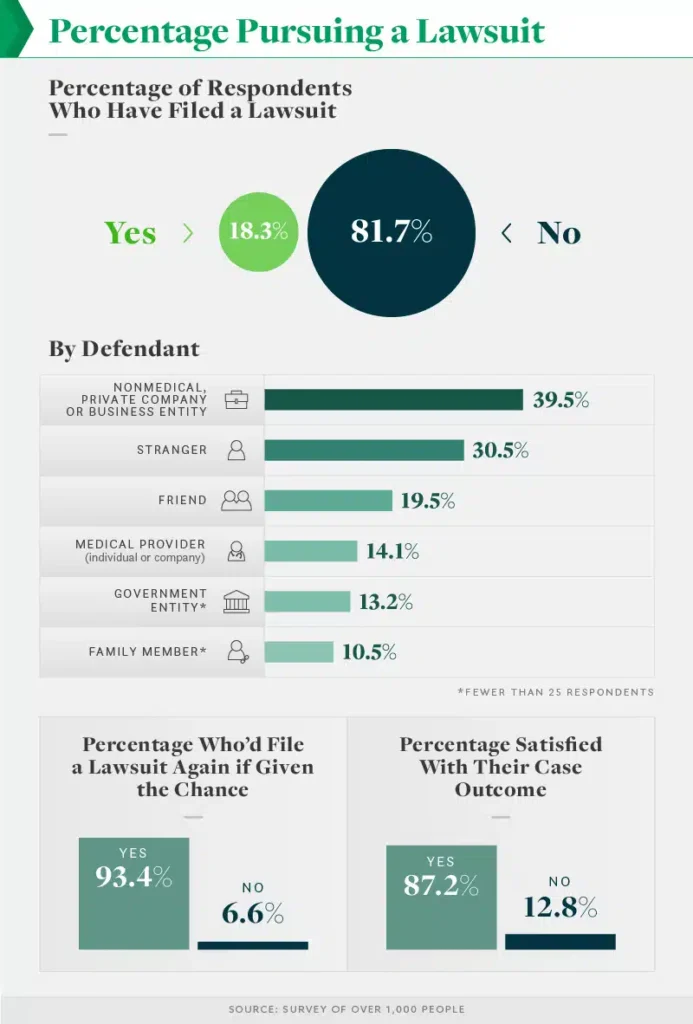
Lawsuit Satisfaction?
Among our respondents, roughly 4 in 5 had never pursued a lawsuit against another party. Those who had, however, were most likely to have sued a private company in a nonmedical industry. This finding might be explained by the dual exposure of private businesses: They can face suits from employees alleging discrimination or wrongful termination as well as tort or breach of contract cases from customers. Strangers were another common category of defendant, accounting for over 30 percent of cases. Conversely, lawsuits against family members were the least common, either because serious wrongdoing among kin was relatively rare or confronting a family member in court seemed unappealing.
Regardless of the circumstances in which they filed their lawsuits, 93 percent of respondents who had filed a lawsuit before said they would do it again. This attitude was reflected in client satisfaction with their outcomes as well: 87 percent of individuals who had brought lawsuits in the past felt satisfied with the conclusion of their case. These numbers may reflect how often claims are settled, resulting in a monetary award without the drama of an extended trial. In medical malpractice suits, for example, insurance companies often urge providers to settle to avoid the possibility of a massive judgment.
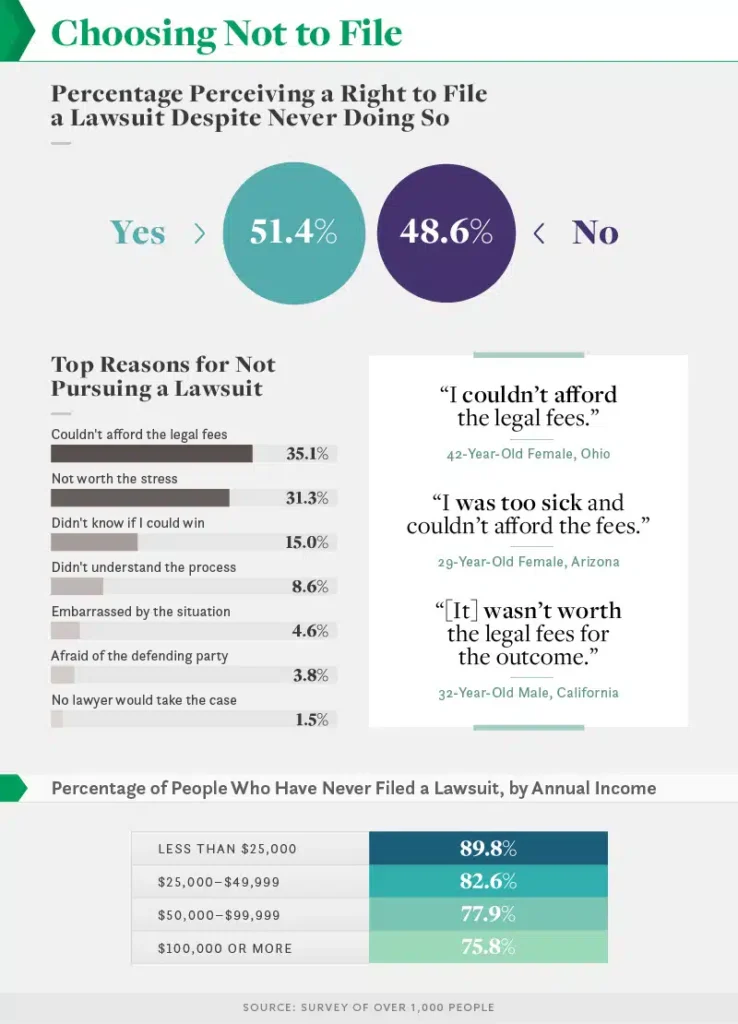
Avoiding Legal Action
If the majority of respondents had not filed a lawsuit before, was that because they felt no reason to do so? Actually, among the group who had never filed a lawsuit, more than half said they had reason to sue. For those who had decided not to sue, the most common cause was financial: More than a third reported they could not afford the legal fees a lawsuit might entail. Even in cases in which legal fees are compensated only in the event of a favorable settlement or judgment (a contingent fee arrangement), many potential plaintiffs feared that other initial costs would be too great a burden. This was despite the fact that many firms only collect those fees if a client wins, and most firms will cover up-front costs as part of their initial investment in taking on a case.
Given the prevalence of financial concerns related to bringing a lawsuit, it makes sense that those with higher incomes represented a disproportionate share of those who had undertaken suits before: Over a quarter of those who earned $100,000 said they have filed lawsuits, more than any other income bracket in the study. Not all barriers to choosing to pursue a lawsuit dealt with the perceived cost, however. Roughly 3 in 10 people who elected not to sue did so to avoid the stress that a lawsuit might have caused. Additionally, 15 percent attributed their choice to uncertainty about winning, and nearly 9 percent felt they did not understand the legal process well enough to file a lawsuit.
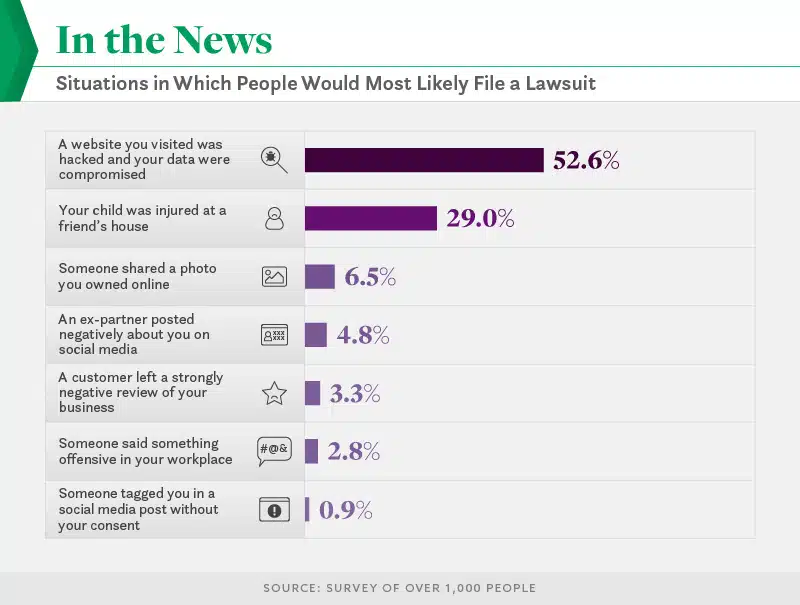
Headlines vs. Heading to Court
The digital age has introduced novel concerns pertaining to privacy, safety, and reputation – and these issues often translate into high-stakes lawsuits closely scrutinized by the media. One such instance was the Equifax hack in 2017, in which millions of users were rendered vulnerable to identity theft. Fifty-three percent of respondents said they would file a lawsuit if such circumstances affected them personally – a route thousands have already taken in suing Equifax. Other questions of privacy and ownership on digital platforms didn’t seem to concern respondents so much. Only 7 percent said they’d sue if someone used a photo of theirs without permission, and just 5 percent said they’d take legal action in response to an ex’s attacks on social media.
Some complex cases don’t pertain to online activity, however: Nearly 3 in 10 people said they would take legal action if their child were hurt at a friend’s home. Additionally, 3 percent of people said they would sue over an offensive statement made in the workplace. Of course, a single statement may not qualify as a pattern of abuse or discrimination, but it could contribute to creating a “hostile work environment,” a basis for a harassment lawsuit in some cases.
Your Choice, Our Team
Our data indicate that most people would feel justified in filing lawsuits to redress a range of grievances, from defamation to wrongful death. And as we discovered here, most individuals who undertake lawsuits are happy with their decisions to do so. For those who have been injured, these findings may offer encouragement to seek the justice to which they’re entitled. Legal outcomes are frequently imperfect and rarely swift, but this reality should not prevent injury survivors from exercising their rights.
Of course, the decision to file a lawsuit is often complex, both practically and emotionally. In the aftermath of an injustice or injury, no one should have to navigate his or her legal options alone. At Farah & Farah, our team of experienced attorneys can help you understand your options, giving you the information necessary to make a sound decision. That means you can begin to move forward, fully confident that you made the best choice for your future.
Methodology
This campaign surveyed 1,014 American adults with valid driver’s licenses whose primary form of transportation was a motor vehicle. The sample included 523 men (average age 35.9 years old) and 491 women (average age 37.1 years old). Of this sample, 176 respondents reported having pursued at least one lawsuit. Respondents answered a series of questions on a survey built via SurveyMonkey and administered via Amazon’s Mechanical Turk service. The survey was based on self-reported data, and responses were not checked against records of judgments, settlements, or any other official documentation of legal proceedings. Self-reported data can also be limited by several extraneous factors, such as incorrect/incomplete recollections, minimizing, response bias, or other demand characteristics.
With respect to certain legal terms used in the project, exact definitions were not provided to participants, and participants saw the terms exactly as they appear here. This is especially pertinent for the first data graphic, in which some of the terms used imply fault (e.g., medical malpractice or wrongful death), but the hypothetical nature of the question means that actual causality would not have yet been established. The exact text of that question read:
How appropriate do you think it is to sue over the following situations:
- Being injured by unsafe conditions in a public place
- Being injured by unsafe conditions at a business
- Being injured in your own workplace
- Being directly injured by another person in a vehicle
- Being directly injured by another person in an assault
- Financial crimes committed against you (e.g., fraud, theft, or unfair charges)
- Medical malpractice
- Breach of contract
- Being paid less than a similarly skilled or tenured co-worker
- Emotional distress
- Wrongful death (medical)
- Illness or injury due to a dangerous drug/medication
- Not receiving enough compensation from an insurance company
- Illness or injury due to a product (such as food poisoning or a mechanical malfunction in an automobile)
- Discrimination (such as being discriminated against in a hiring process because of race, gender, or sexual orientation)
- Defamation by an organization (such as being harassed or lied about in the media)
- Defamation by an individual (such as being harassed or lied about online)
- Wrongful termination
Sources
- http://centerjd.org/content/fact-sheet-tort-litigation-united-states
- https://www.ama-assn.org/press-center/ama-press-releases/ama-studies-show-continued-cost-burden-medical-liability-system
- https://www.eeoc.gov/filing-lawsuit
- https://www.fda.gov/food/people-risk-foodborne-illness/food-safety-older-adults-and-people-cancer-diabetes-hivaids-organ-transplants-and-autoimmune
- https://www.cbsnews.com/news/lawsuit-filed-against-johnson-johnson-over-pelvic-mesh-implants/
- https://www.womenshealthmag.com/beauty/a19430729/monat-lawsuit-hair-loss/
- https://www.pewresearch.org/short-reads/2017/12/14/gender-discrimination-comes-in-many-forms-for-todays-working-women/
- https://www.cbsnews.com/news/medical-malpractice-lawsuits-fewer-claims-succeed-payouts-rise/
- https://www.liveabout.com/five-most-common-lawsuits-3886658
- https://www.nolo.com/legal-encyclopedia/understanding-health-insurance-claims-personal-injury-settlements.html
- https://www.americanbar.org/groups/public_education/resources/law_issues_for_consumers/lawyerfees_contingent/
- https://time.com/nextadvisor/
- https://www.eeoc.gov/harassment


















